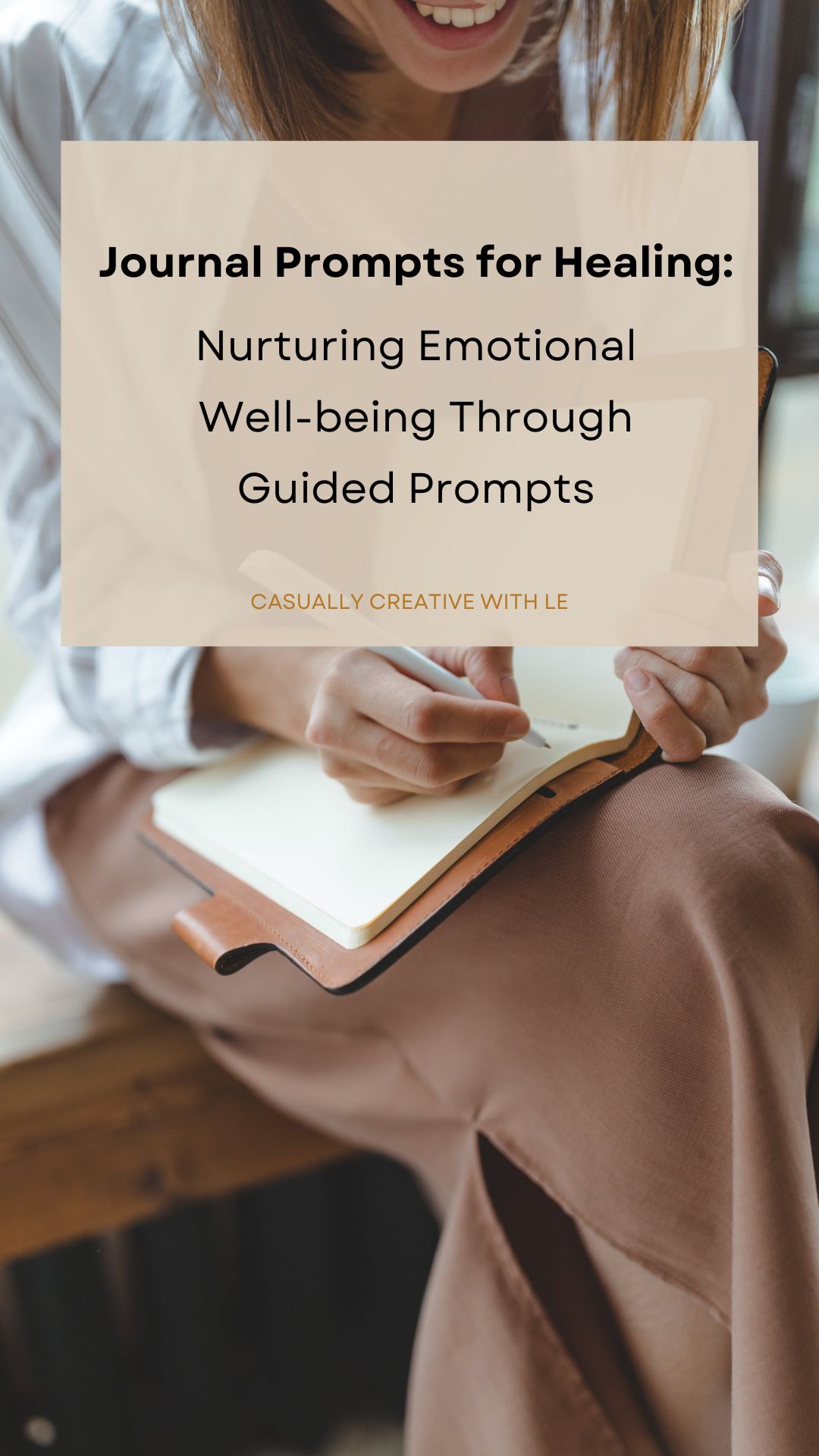
Journaling is a powerful tool for self-reflection and emotional healing. The act of putting your thoughts and feelings on paper can be a cathartic and empowering experience. You don’t need to be a writer or an expert to get started; you only need an open heart and a few minutes to yourself. In this blog, I’m e going to share the incredible benefits of journaling for healing, some practical tips, and a plethora of journal prompts to get those thoughts flowing.
Journaling isn’t just about putting words on paper; it’s a process that can lead to significant emotional and psychological benefits. Picture this: you’re having a rough day, your emotions are all over the place, and you’re unsure where to turn. Journaling can be your sidekick in these moments. It’s like having a heart-to-heart with yourself. It helps you process emotions, reduce stress, and grow personally.
Before you start journaling:
- Create a conducive environment.
- Find a quiet, comfortable space where you won’t be easily distracted.
- Choose the journaling platform that suits you best, whether it’s a physical notebook, a digital app, or the notes section of your phone!
Consistency is key, so set aside dedicated time for your journaling practice.
Here are some basic tips to get you started with journaling:
- Write freely without worrying about grammar or structure.
- Don’t self-censor; let your thoughts flow.
- Date your entries to track your progress.
- Use prompts when you’re unsure of what to write.

Types of Healing Journal Prompts
Inner Child Healing
- Begin by picturing your younger self, perhaps the child version of you at a specific age. What were your dreams, fears, and desires back then? Write a letter to your inner child, offering love, understanding, and comfort.
- Recall a specific childhood memory, whether positive or challenging. Write about it in detail, and then reflect on how it might have influenced your beliefs, behaviors, or emotions as an adult.
- Think about any emotional wounds or painful experiences from your childhood. How have these wounds affected your life? Write a letter of healing and forgiveness to yourself, acknowledging the pain and nurturing self-compassion.
- Imagine taking your inner child on an adventure or to a place they’ve always wanted to visit. Write a journal entry describing the experience and the joy it brings to your inner child.
- Consider the boundaries you might need to establish to protect and nurture your inner child. What actions or practices can you implement in your life to ensure your inner child’s well-being and happiness?
Emotional Healing Prompts:
- Write about a recent situation that made you feel angry or upset. What triggered these emotions, and how can you cope with them?
- Describe a moment in your life when you felt truly happy. What can you learn from that experience?
- Write a letter to someone you need to forgive, expressing your feelings and focusing on forgiveness.
- Reflect on a challenging experience or loss, and write about how it changed you, what you’ve learned, and how you can grow stronger.
- Write a kind and understanding letter to yourself, addressing any negative self-talk or self-doubt.
Self-Reflection Prompts:
- List your strengths and weaknesses. How can you leverage your strengths to overcome your weaknesses?
- Reflect on a mistake you made recently. What did you learn from it, and how can you prevent similar mistakes in the future?
- Consider your current path in life, and write about where you are headed, what changes you’d like to make, and the steps needed to get there.
- Take a moment to think about your recent personal growth and describe how you’ve evolved, what you’ve learned, and your aspirations for continued self-improvement.
- Reflect on the people, experiences, or things you’re grateful for in your life and how they’ve influenced your personal journey.

Gratitude Prompts:
- List five things you’re grateful for today.
- Write a letter to someone (you don’t have to share it if you don’t want to) you appreciate, and explain why they mean so much to you.
- Reflect on a recent obstacle or challenge, and find three positive aspects or lessons you can be grateful for.
- Take a moment to notice and express gratitude for the small, everyday things that often go unnoticed.
- Reflect on a personal achievement or milestone in your life, and write about the steps you took to reach it, as well as the people who supported you along the way.
Healing Trauma Prompts:
- Write about a traumatic event from your past. How has it impacted your life, and what steps can you take towards healing?
- What self-care practices can you implement to support your healing journey?
- Explore your inner resilience by writing about the strengths and coping mechanisms that have helped you overcome trauma and how you can further nurture this resilience in your healing process.
- Write a letter to yourself, addressing the trauma you’ve experienced and offering self-compassion, understanding, and support as if you were comforting a dear friend.
Relationship/Divorce Healing:
- Write about the relationship, including the positive and negative aspects. What did you learn from it, and what aspects would you like to carry forward or leave behind as you move forward?
- Express your emotions, whether it’s sadness, anger, relief, or confusion. Write freely, without judgment, about what you’re feeling.
- Reflect on the process of forgiving yourself and your former partner for any mistakes or hurt in the relationship. How can you release any lingering resentment and move toward healing?
- Explore your sense of self outside of the relationship. What are your personal interests, dreams, and values that you’d like to focus on now? How can you nurture your individual identity?
- Consider what you would like in future relationships. What qualities and dynamics are essential to you, and what lessons from your past can guide your future choices?

Goal-Setting and Vision Prompts:
- What are your short-term and long-term goals? How will you achieve them?
- Describe your ideal life five years from now. What steps can you take to move closer to that vision?
- Reflect on the meaningful relationships in your life, both current and potential. What goals can you set to strengthen those connections and deepen your bonds with loved ones?
- Consider your physical, emotional, and mental well-being. What steps can you take to nurture your health and personal growth in the short and long term?
- Envision the experiences and adventures you’d like to have in your life. What new places would you like to visit? What hobbies or activities would you like to try or master?
- If family or parenthood is part of your vision, write about the goals you have in terms of your family, children, or future family planning and the kind of parent or family member you aspire to be.
- Reflect on your creative side. What artistic or creative goals do you want to pursue, and how can you nurture your artistic talents or interests?
- Consider the knowledge and skills you’d like to acquire or develop throughout your life. How can you continue to be a lifelong learner and grow in areas of interest or passion?
- Identify potential obstacles or challenges that might impede your progress toward your goals, and write about strategies to overcome or navigate these hurdles.
- Consider the legacy you want to leave and the impact you hope to make on the world. Write about the values and goals that drive you in this direction and how they shape your actions and decisions.
This extensive list of journal prompts provides you with a diverse range of self-reflective and healing exercises to aid your personal growth and emotional well-being. They encourage self-compassion, forgiveness, and nurturing your inner resilience, ultimately helping you become more in touch with yourself and your aspirations.

Overcoming Common Journaling Challenges
Let’s address some speed bumps you might hit on your journaling journey. Procrastination, self-doubt, and motivation struggles—yup, they happen to the best of us. Here are some strategies to overcome them:
- Set realistic goals and expectations.
- Use positive affirmations to combat self-doubt.
- Join a journaling group or community for motivation and support.
Journaling is your personal tool for growth and healing. It’s a place to explore your feelings, dreams, and life. So, whether you’re working through past pain, setting your sights on big goals, or just counting your blessings, there’s a prompt perfect for you.
As you start on this new journey, remember that healing takes time, and journaling is a patient companion. Start with the prompts that resonate most with you, and feel free to create your own. Your journal is a canvas for your thoughts and feelings, a place where you can explore the depths of your emotional well-being and become stronger and more self-aware. Have any journal prompts to share? Let me know below!
